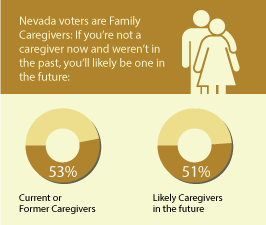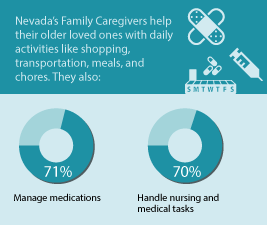AARP Hearing Center
A new statewide survey highlighting Nevada family caregiver experiences, challenges and needs indicates overwhelming support for the CARE Act (SB177) and other measures aimed at helping caregivers. The survey recognizes and supports the important role an estimated 532,000 Nevadans play throughout the year as family caregivers. Their unpaid work and assistance makes it possible for parents, spouses and other loved ones to live independently at home.
“Today in Nevada, a silent army of more than half a million unpaid family caregivers are the unheralded backbone of our state’s care system, providing more 348 million hours of care, valued at about $4 billion annually,” said Carla Sloan, state director of AARP Nevada.
“If you’re not a caregiver now, you were one in the past, or you’ll likely be one in the future,” Sloan continued. “This survey should be a wake-up call to leaders about Nevada family caregiver realities and challenges, and what our state needs to do to better support the challenges family caregivers face.”

The survey of 800 Nevada registered voters age 45 and older shows that most have either had experience as family caregivers (53 percent), or believe they are likely to be caregivers in the future (51 percent), and they are strongly in favor of measures to help improve supports for family caregivers. The survey was conducted by telephone December 1-9, 2014, and has a margin of error of 3.5 percent.
According to the survey, typical current family caregivers in Nevada are women (63 percent) over the age of 55 (69 percent). They are likely to be married (77 percent), college educated (58 percent), and employed (46 percent). The average age of the person they are caring for is 75 years old.
Nevada family caregivers report they are providing care in a myriad of ways – from assisting with transportation (87 percent) to aiding with household chores (85 percent). One of the most noteworthy findings of the survey: Nevada family caregivers are heavily involved in the medical side of care of their loved ones. Over 70 percent of caregivers assist with complex care like medication management and overseeing other nursing and medical tasks such as wound care and IVs and injections.
Current or past caregivers responding to the survey report feeling stressed emotionally (66 percent). Nine in 10 current and past Nevada caregivers say it is important for them to continue to provide care for their loved one so that they can keep living independently in their own home. Seventy-six percent say it is extremely or very important for there to be more resources and training for family caregivers.

That’s why AARP Nevada and more than 40 community organizations statewide are advocating for passage of SB177, known as the CARE Act – legislation designed to help unpaid family caregivers when their loved ones go into the hospital, and as they transition home. SB177 aims to improve communication between hospitals and caregivers, ensuring the caregiver is notified when a loved one is discharged or transferred, and receives instruction on any after-care required at home – such as dressing wounds or managing prescriptions. These common sense steps can make the difference between a successful transition home and a return trip to the hospital, or worse.
The survey finds Nevadans are overwhelmingly in support of measures outlined in the CARE Act, with 95 percent indicating their support for requiring hospitals to demonstrate medical and nursing tasks to caregivers; 92 percent support for requiring hospitals to keep caregivers informed of major decisions, like discharges; and 81 percent support for requiring hospitals and care facilities to record caregiver information upon admission.
“Because the CARE Act helps both family caregivers and their loved ones who need their care, it is easy to understand why a majority of Nevadans understand, connect with, and support each of these provisions,” said Sloan. “However, when a survey finds 81, 92, and 95 percent support for the core components of the proposal, that is more than support - that is a demand for action.”































































